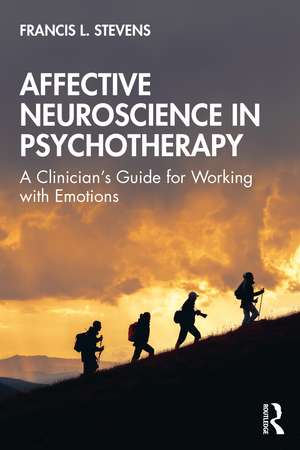Affective Neuroscience in Psychotherapy: A Clinician's Guide for Working with Emotions
Autor Francis Stevensen Limba Engleză Paperback – 28 sep 2021
Most psychological disorders involve distressful emotions, yet emotions are often regarded as secondary in the etiology and treatment of psychopathology. This book offers an alternative model of psychotherapy, using the patient's emotions as the focal point of treatment. This unique text approaches emotions as the primary source of intervention, where emotions are appreciated, experienced, and learned from as opposed to being solely regulated.
Based on the latest developments in affective neuroscience, Dr. Stevens applies science-based interventions with a sequential approach for helping patients with psychological disorders. Chapters focus on how to use emotional awareness, emotional validation, self-compassion, and affect reconsolidation in therapeutic practice. Interventions for specific emotions such as anger, abandonment, jealousy, and desire are also addressed.
This book is essential reading for clinicians practicing psychotherapy, social workers and licensed mental health counselors.
| Toate formatele și edițiile | Preț | Express |
|---|---|---|
| Paperback (1) | 243.77 lei 43-57 zile | |
| Taylor & Francis – 28 sep 2021 | 243.77 lei 43-57 zile | |
| Hardback (1) | 942.96 lei 43-57 zile | |
| Taylor & Francis – 28 sep 2021 | 942.96 lei 43-57 zile |
Preț: 243.77 lei
Nou
46.65€ • 48.43$ • 38.90£
Carte tipărită la comandă
Livrare economică 24 martie-07 aprilie
Specificații
ISBN-10: 036771440X
Pagini: 185
Ilustrații: 3 Line drawings, black and white; 3 Halftones, black and white; 6 Illustrations, black and white
Dimensiuni: 152 x 229 x 15 mm
Greutate: 0.25 kg
Ediția:1
Editura: Taylor & Francis
Colecția Routledge
Locul publicării:Oxford, United Kingdom
Public țintă
Postgraduate, Professional, and Professional Practice & DevelopmentCuprins
Notă biografică
Recenzii
Karin Maria Hodges, Psychologist, Private Practice, Concord, MA
"Cognitive approaches to psychotherapy have come to dominate the field in recent decades, in part because of their solid scientific foundation. They typically view emotional distress as a symptom to be reduced. Psychotherapy approaches that emphasize experiencing and processing emotional distress are effective but less well validated. This excellent book aims to restore the balance and does more to link recent advances in basic affective neuroscience and psychotherapy practice than any other. Recommended for beginning psychotherapists as well as any clinician who takes emotional processing in psychotherapy seriously and wants to know how and why it works."
Richard D. Lane, M.D., Ph.D., Professor of Psychiatry, Psychology and Neuroscience, University of Arizona; Editor (with Lynn Nadel) of Neuroscience of Enduring Change: Implications for Psychotherapy (Oxford University Press)
"Dr. Stevens has done a fine job of compiling recent information on affective neuroscience and its application to therapy. His clinical examples help to illustrate key concepts. This book provides a helpful introduction to these topics."
Alexis D. Abernethy, Ph.D., Professor of Clinical Psychology , School of Psychology & Marriage and Family Therapy, Fuller Theological Seminary
Descriere
Most psychological disorders involve distressful emotions, yet emotions are often regarded as secondary in the etiology and treatment of psychopathology. This book offers an alternative model of psychotherapy, using the patient's emotions as the focal point of treatment. This unique text approaches emotions as the primary source of intervention, where emotions are appreciated, experienced, and learned from as opposed to being solely regulated.
Based on the latest developments in affective neuroscience, Dr. Stevens applies science-based interventions with a sequential approach for helping patients with psychological disorders. Chapters focus on how to use emotional awareness, emotional validation, self-compassion, and affect reconsolidation in therapeutic practice. Interventions for specific emotions such as anger, abandonment, jealousy, and desire are also addressed.
This book is essential reading for clinicians practicing psychotherapy, social workers and licensed mental health counselors.
